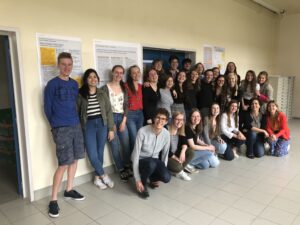
Onderzoek
De onderzoekers bij Duitse taalkunde zijn aangesloten bij de onderzoeksgroepen ΔiaLing en GLiMS. Hun onderzoek legt zich toe op historische en diachrone taalkunde enerzijds en contrastief-typologische taalkunde met bijzondere aandacht voor het Duits anderzijds. Ook variatie in het hedendaagse Duits en op dit moment lopende taalveranderingen (vooral corpuslinguïstisch, toenemend ook experimenteel) worden onderzocht, en er is een contrastief perspectief in veel projecten aanwezig waarbij lexicale, morfologische, syntactische en semantico-pragmatische fenomenen en hun (micro)diachrone ontwikkeling in oudere taalstadia van het Duits, maar ook in andere (Germaanse) talen in vergelijking met het Duits onderzocht worden. Er wordt vanuit verschillende theoretische en methodologische invalshoeken gewerkt, o.m. functionele benaderingen, constructiegrammatica, maar ook generatieve grammatica en variationele sociolinguïstiek. Daarnaast wordt er onderzoek verricht op gebied van de discours- en politolinguïstiek. De onderzoekers bij Duitse taalkunde zijn intensief betrokken in internationale onderzoeksverbanden en werken o.m. samen met collega’s aan de universiteiten van Mainz, Konstanz, Hamburg, Berlijn, Padua, Cambridge en Oxford, maar ook met het Meertens Instituut (Amsterdam) en het Instituut voor de Nederlandse Taal (Leiden). De onderzoeksgroep publiceert vooral in het Duits en Engels.
Lopende doctoraatsprojecten
- The hierarchical lexicon. A contrastive study into productivity and schematicity of nominal compounds in German, Dutch and Swedish (Malte Battefeld)
- Concessive conditionals. A typological study (Tom Bossuyt)
- Prosodic cues to syntactic reanalysis. Experimentally tracking Jespersen’s cycle in progress (Giuseppe Magistro)
- Onset and (de)grammaticalization of genitive of negation in Germanic. A historical and typological analysis (Giacomo Bucci)
- A constructionist micro-typology of concessive conditionals in present-day German. Patterns of formal and functional variation (Flor Vander Haegen)
Afgesloten doctoraatsprojecten
- Subject agreement phenomena in Middle Low German (Melissa Farasyn)
- Continuity or change? The post-cyclic development of preverbal negation in continental West Germanic (Elisabeth Witzenhausen)
Postdoctoraal onderzoek
- Syntactic optionality in North and West Germanic. Insights from the history of Icelandic and Low German (Hannah Booth)
- AINT. Allomorphy In sentential Negative markers conditioned by TAM (Karen De Clercq)
Onderzoeksinfrastructuur:
CHLG: A parsed corpus of historical Low German